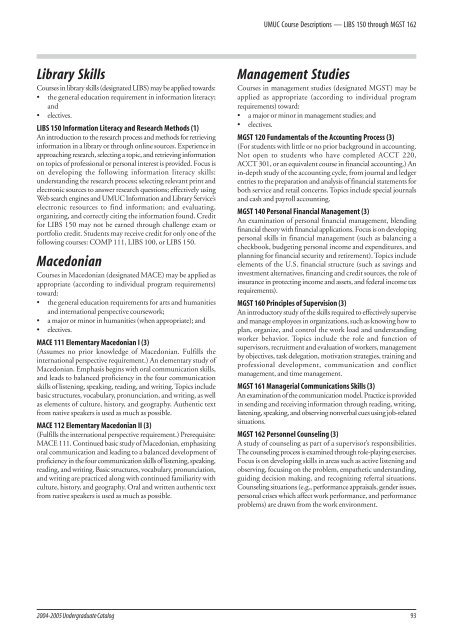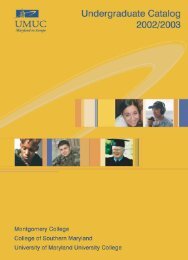Statements of Policy - UMUC Europe
Statements of Policy - UMUC Europe
Statements of Policy - UMUC Europe
Create successful ePaper yourself
Turn your PDF publications into a flip-book with our unique Google optimized e-Paper software.
Library Skills<br />
Courses in library skills (designated LIBS) may be applied towards:<br />
• the general education requirement in information literacy;<br />
and<br />
• electives.<br />
LIBS 150 Information Literacy and Research Methods (1)<br />
An introduction to the research process and methods for retrieving<br />
information in a library or through online sources. Experience in<br />
approaching research, selecting a topic, and retrieving information<br />
on topics <strong>of</strong> pr<strong>of</strong>essional or personal interest is provided. Focus is<br />
on developing the following information literacy skills:<br />
understanding the research process; selecting relevant print and<br />
electronic sources to answer research questions; effectively using<br />
Web search engines and <strong>UMUC</strong> Information and Library Service’s<br />
electronic resources to find information; and evaluating,<br />
organizing, and correctly citing the information found. Credit<br />
for LIBS 150 may not be earned through challenge exam or<br />
portfolio credit. Students may receive credit for only one <strong>of</strong> the<br />
following courses: COMP 111, LIBS 100, or LIBS 150.<br />
Macedonian<br />
Courses in Macedonian (designated MACE) may be applied as<br />
appropriate (according to individual program requirements)<br />
toward:<br />
• the general education requirements for arts and humanities<br />
and international perspective coursework;<br />
• a major or minor in humanities (when appropriate); and<br />
• electives.<br />
MACE 111 Elementary Macedonian I (3)<br />
(Assumes no prior knowledge <strong>of</strong> Macedonian. Fulfills the<br />
international perspective requirement.) An elementary study <strong>of</strong><br />
Macedonian. Emphasis begins with oral communication skills,<br />
and leads to balanced pr<strong>of</strong>iciency in the four communication<br />
skills <strong>of</strong> listening, speaking, reading, and writing. Topics include<br />
basic structures, vocabulary, pronunciation, and writing, as well<br />
as elements <strong>of</strong> culture, history, and geography. Authentic text<br />
from native speakers is used as much as possible.<br />
MACE 112 Elementary Macedonian II (3)<br />
(Fulfills the international perspective requirement.) Prerequisite:<br />
MACE 111. Continued basic study <strong>of</strong> Macedonian, emphasizing<br />
oral communication and leading to a balanced development <strong>of</strong><br />
pr<strong>of</strong>iciency in the four communication skills <strong>of</strong> listening, speaking,<br />
reading, and writing. Basic structures, vocabulary, pronunciation,<br />
and writing are practiced along with continued familiarity with<br />
culture, history, and geography. Oral and written authentic text<br />
from native speakers is used as much as possible.<br />
<strong>UMUC</strong> Course Descriptions — LIBS 150 through MGST 162<br />
Management Studies<br />
Courses in management studies (designated MGST) may be<br />
applied as appropriate (according to individual program<br />
requirements) toward:<br />
• a major or minor in management studies; and<br />
• electives.<br />
MGST 120 Fundamentals <strong>of</strong> the Accounting Process (3)<br />
(For students with little or no prior background in accounting.<br />
Not open to students who have completed ACCT 220,<br />
ACCT 301, or an equivalent course in financial accounting.) An<br />
in-depth study <strong>of</strong> the accounting cycle, from journal and ledger<br />
entries to the preparation and analysis <strong>of</strong> financial statements for<br />
both service and retail concerns. Topics include special journals<br />
and cash and payroll accounting.<br />
MGST 140 Personal Financial Management (3)<br />
An examination <strong>of</strong> personal financial management, blending<br />
financial theory with financial applications. Focus is on developing<br />
personal skills in financial management (such as balancing a<br />
checkbook, budgeting personal income and expenditures, and<br />
planning for financial security and retirement). Topics include<br />
elements <strong>of</strong> the U.S. financial structure (such as savings and<br />
investment alternatives, financing and credit sources, the role <strong>of</strong><br />
insurance in protecting income and assets, and federal income tax<br />
requirements).<br />
MGST 160 Principles <strong>of</strong> Supervision (3)<br />
An introductory study <strong>of</strong> the skills required to effectively supervise<br />
and manage employees in organizations, such as knowing how to<br />
plan, organize, and control the work load and understanding<br />
worker behavior. Topics include the role and function <strong>of</strong><br />
supervisors, recruitment and evaluation <strong>of</strong> workers, management<br />
by objectives, task delegation, motivation strategies, training and<br />
pr<strong>of</strong>essional development, communication and conflict<br />
management, and time management.<br />
MGST 161 Managerial Communications Skills (3)<br />
An examination <strong>of</strong> the communication model. Practice is provided<br />
in sending and receiving information through reading, writing,<br />
listening, speaking, and observing nonverbal cues using job-related<br />
situations.<br />
MGST 162 Personnel Counseling (3)<br />
A study <strong>of</strong> counseling as part <strong>of</strong> a supervisor’s responsibilities.<br />
The counseling process is examined through role-playing exercises.<br />
Focus is on developing skills in areas such as active listening and<br />
observing, focusing on the problem, empathetic understanding,<br />
guiding decision making, and recognizing referral situations.<br />
Counseling situations (e.g., performance appraisals, gender issues,<br />
personal crises which affect work performance, and performance<br />
problems) are drawn from the work environment.<br />
2004-2005 Undergraduate Catalog 93






